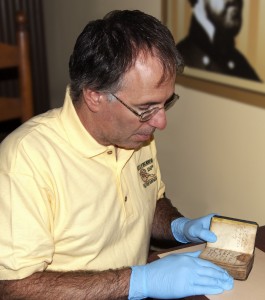
Terry Hackney of the Beverly Heritage Center examines a prayer book captured at the Battle of Rich Mountain.
Like all good mysteries, it started with a discovery.
Sisters Carey Flinn Howells and Jennifer Flinn Marks were exploring some custom-made bookcases in the library of an old home the Howells had just moved to in Cleveland Heights, Ohio.
Tucked in the dark recesses of a cabinet was a little leather-bound book. Numbering more than 500 pages, but measuring only 4 x 2 ½ inches, it must have been overlooked and left behind.
The sisters carefully opened the well-worn little volume and read its title page: “The Path to Paradise; Or, the Way of Salvation” with the “Approbation of the Most Rev. John Hughes, Archbishop of New York.” The publication date was 1857.
This little Catholic prayer book, filled with religious engravings, was a curiosity in itself. But some old inscriptions just inside the covers sparked a real mystery.
In old brown ink, two of the inscriptions read:
“Philip Bader, a Private in the 19th Ohio Infantry.”
“Presented to Mary Drumm by Philip Bader. Taken on the Battle Field at Rich Mountain from a Dead Secesh Soldier.”
Recognizing the little book as an artifact of historical significance, the sisters placed it in a safe. There matters rested until recently when Carey’s husband Dion Howells contacted Terry Hackney of the Rich Mountain Battlefield Foundation in Beverly, West Virginia. Terry did some background research, and put the author in contact with the owners.
The Flinn, Marks and Howells families made it clear that the prayer book was not for sale. Their goal was to find a proper home for the artifact, where it could be shared with the public and its story revealed. That place was the Beverly Heritage Center.
By their own admission, the families take seriously a “commitment to make this world a better place,” as witnessed by Dion Howells’ book: The Story of David: How we created a family through open adoption (Delacorte Press, 1997).
Research has begun to reveal the prayer book’s amazing story.
Twenty-one year-old Philip H. Bader enlisted as a private in K Company, 19th Ohio Infantry on April 23, 1861, soon after the outbreak of the Civil War. Bound for Virginia, he was fated to fight in one of the war’s first battles.
On July 11, 1861, atop the lonely crest of Rich Mountain, Bader and some 1,900 Federal troops drove out 310 resolute Confederates. The Union victory on Rich Mountain made Major General George McClellan a national hero and paved the way for West Virginia statehood.
Bader sought a memento of the fight. Taking the prayer book from a dead Confederate soldier, he inscribed it for posterity, using the term “Secesh”—slang for Secessionist—in describing his foe. That prayer book had been carried into battle as a source of comfort and inspiration. For Private Bader, it became a trophy from his first battle—grim reminder of a day he would never forget.
More remarkable was Philip Bader’s knack for survival. Records show he later served in the 65th Ohio Volunteer Infantry, was discharged for medical reasons, and then reenlisted in the 10th Ohio Volunteer Cavalry. Quartermaster Sergeant Philip Bader was captured on August 19, 1864 near Atlanta, Georgia, and incarcerated at the South’s deadliest prisoner of war stockade, Camp Sumter, at Andersonville.
Surviving the deplorable camp at Andersonville until his release in 1865, Bader boarded a paddlewheel steamboat on the Mississippi River to return home. That boat was the “Sultana.”
On April 27, 1865, Bader was among the few survivors of the explosion and sinking of the Sultana, in which an estimated 1,800 of 2,400 passengers were killed—the worst maritime disaster in American history!
Philip Bader lost three fingers and a thumb in that disaster, and was discharged from the army. He died on May 29, 1877 and is buried in Brookmere Cemetery, Cleveland, Ohio. His captured prayer book is now on exhibit at the Beverly Heritage Center in Beverly, West Virginia. For more information: www.richmountain.org, or www.beverlyheritagecenter.org, 304-637-7424.



